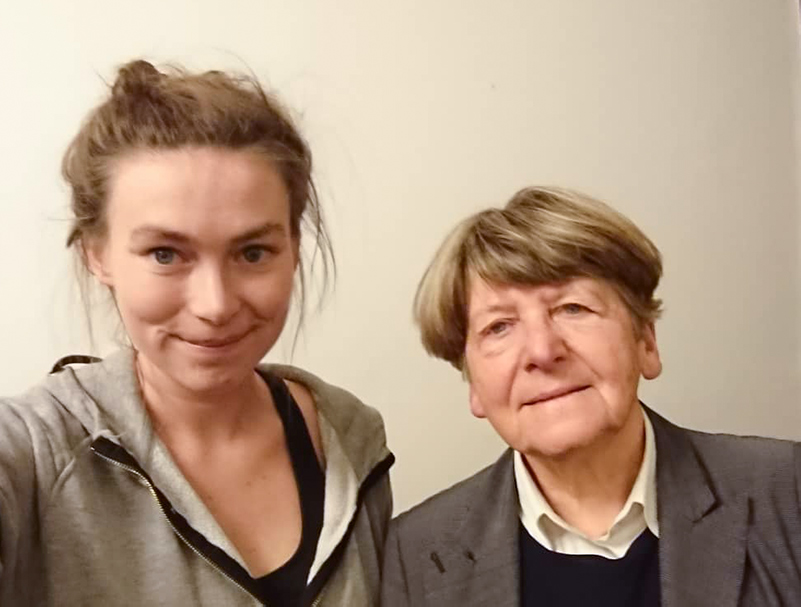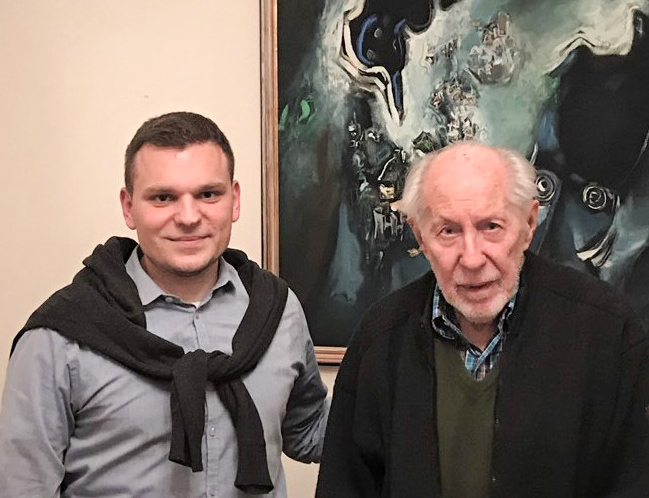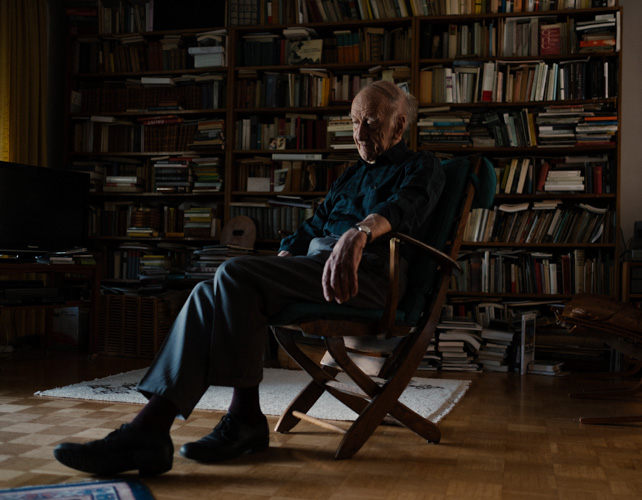Alena Wagnerová is a German-Czech writer, cultural journalist and oral historian born in Brno in 1936.
Wagnerová grew up in a three-generation progressive household and experienced the war first hand during the bombardments of her hometown and annexation of Brno by the Germans. Already at school, Wagnerová set up a a discussion group in Brno with links to Vaclav Havel’s Thirty-Six circle in Prague.
Her original career aspiration was to become an archaeologist but studied art history and biology instead; primarily for the reason that the biology faculty was not indoctrinated by political and communist sentiments. She later also earned a doctorate in biology.
Her publishing activity began in the late sixties with her move to West Germany in 1969 and her study of German literature there; a time she now defines as regressive in terms of her own personal emancipation: “[In Germany] nothing was expected from me, as a woman”.
In this period, she began to devote her research to the difference between the emancipation of women in Czechoslovakia and West Germany; the female perspective will accompany her throughout her whole publishing career. She has published a biography of Sidonia Nádherná [Czech baroness, later Countess von Thun und Hohenstein] and has been focusing on Milena Jesenská [Czech journalist, who was romantically involved with Franz Kafka] out of and the family of Hermann Kafka [father of Franz Kafka]. Being an oral historian, she also did research and published on women’s memory and conducted a major governmental project of memory of the antifascist Germans from Sudetenland.Last year she published a short-story collection, Cestou Životem (“On the Way Through Life”).
Wagnerová has moved between both countries since 1969. She defines herself as enither Czech or German. She currently lives in Saarbrücken.
In this interview Alena Wagnerová reflects on the social, intellectual and political differences and influences of the overlapping generations that shaped post-war society, both in the Czech Republic and in Germany.
Alena Wagnerová was interviewed by Tereza Reichelová, a Czech publicist and political scientist, focusing mostly on ecofascism. She collaborates with Contradictions, A2 cultural fortnightly and A2larm. She currently lives in Spain.
Interview Highlights
On the Munich agreement of 1938
Well, I would say that my own micro-history entered “big” history when I was two years old. I was sitting on my little potty in the bedroom, the door opened and there was a huge shadow walking up the stairs of our family house in Brno, the Královo Pole district. As the shadow came closer, I realized it was my father and I exclaimed, “Daddy, you’re back!?” – my dad had just been demobbed. He returned as a defeated soldier in autumn 1938. He was glad to come back to his family, glad to be alive, but he had also returned as a defeated soldier. When we were older and he spoke about it later, he told us how his pupils – he was their favourite teacher – at the trade academy in Brno—snapped at him after his demobilisation, after the Munich Agreement [The Munich Agreement was a decision concluded by Germany, UK, the French Third Republic and the Kingdom of Italy in Munich in 1938, which stated that Czechoslovakia should turn over the Sudet territory to Germany; from the Czechoslovakian perspective it was named the “Munich Betrayal”]. They used to say to him, “Professor, why did you lie to us? What you taught us about democracy, about the Republic: it wasn’t true.” When I was thinking about this, when I was older and almost an adult, I realized that that was the moment, when I entered “big” history.
On the war
How did we experience the war? [pauses] In the street I grew up on there were eight semi-detached houses, in which families would live. Two out of the men, who were living in those semi-detached family houses, were held in captivity during the war. One in Dachau and one in Buchenwald – that man was the major of Brno before, Dr. Spazier. A collaborator lived across the street, and it was him who denounced us. Two houses down, there lived a family whose daughter had to move abroad, to the US, I think, because she was married to a Jew. And before I forget that: The son of the family that was living in the house on the corner, he was fought for the English army. It is interesting that history had such an impact, even in our small street [laughs].
On wanting to create something new
In contrast to the previous one, in our generation were very few committed communists. I’m not saying that many people were not in the Party for various reasons but thinking back on what I saw in our generation, there were only a few staunch communists. […] That is in contrast to the previous generation who, in a sense, expected us to carry out what they wanted. I call it “to keep up and shut up.” [laughs] We—or no, I will speak only for myself—I didn’t really like the preceding generation because they were showing and telling us what to do. Like every new generation, we wanted to create something on our own, and that we couldn’t do. We, for example, found out that young authors in France were founding magazines when they were eighteen years old. We were not allowed to do that, but we did it anyway, and then the police came and told us to please stop it. They were polite, they didn’t punish anyone, but they were saying no. “That’s not possible, you simply can’t do this, you can’t publish a magazine.” That was the atmosphere we were living in.
On life in the 50s
When I think about it today, I would say, we lived with double consciousness those days. Spiritually we lived in the 30s, but the reality we lived in, was different and established by dogmatic Marxism-Leninism. And these two different consciousnesses weren’t standing against each other, but next to each other.
On the social status of women
Regarding my status as a woman, for example among Thirty-sixers [the debating and literary circle founded by Vaclav Havel]: there were no women in the Prague group. It was an all-male group. In our group, there were three boys and three girls. But they always expected that we would accept the male worldview. We didn’t call it the male worldview at that time, but it was a male worldview. The way in which men defined certain things and so on, the notion that we would adopt their ways and that once we had memorized them, we would be accomplished.
You have to understand that in my generation, with regard to intellectual matters, our role model was the dad, not the mum. […] We didn’t have female role models at the level we wanted to reach. My sister […] says that women of the current generation are much more self-assured. This generation simply behaves in a completely different way. They are much more confident. […] It is important to realise that the female revolt costs an immense amount of strength, and it is linked with a deep uncertainty as you have to surpass male norms of perceiving the world that had been binding so far. You can get over them only by exaggerating a little.
On the difference between female emancipation in Germany and in Czechoslovakia
I grew up in a different context. I was already an emancipated woman from Czechoslovakia, so I didn’t have many needs and I didn’t need to re-formulate certain things as they were already clear to me. Also, in our country, women’s emancipation was not framed as a fight of women against men, as it was in the West. Men and women always fought against a certain power limit, part of the emancipation of the Czech nation was emancipation of woman. […] I am not saying that in our country, men were always supporting the emancipation of women, but the idea of women fighting against male patriarchs never existed. The national liberation required women, too. We have five women in the nineteenth century literary canon, German literature does not have that.



